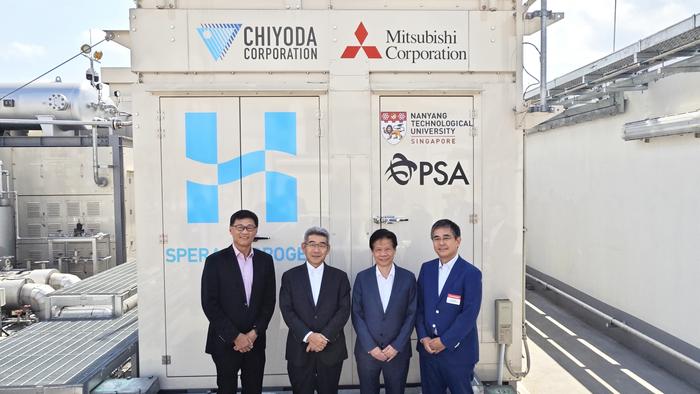Nanyang Technological University, Singapore (NTU Singapore), PSA Singapore (PSA) and Japan’s Chiyoda Corporation (Chiyoda) have begun testing how hydrogen can be transported and stored as methylcyclohexane (MCH), a liquid form at ambient temperature and pressure, before gaseous hydrogen is extracted from MCH to be used as a clean fuel for horizontal transportation in the port.

Credit: PSA Singapore
Nanyang Technological University, Singapore (NTU Singapore), PSA Singapore (PSA) and Japan’s Chiyoda Corporation (Chiyoda) have begun testing how hydrogen can be transported and stored as methylcyclohexane (MCH), a liquid form at ambient temperature and pressure, before gaseous hydrogen is extracted from MCH to be used as a clean fuel for horizontal transportation in the port.
As part of this collaboration and trial, PSA has built and operationalised the first hydrogen refuelling station and provided a hydrogen fuel cell electric prime mover at Pasir Panjang Terminal in Singapore.
The testbed follows successful laboratory proof-of-concept (PoC) experiments led by NTU to enable the efficient and economical transport of hydrogen, which can in turn contribute to the expansion of global hydrogen supply chains.
Hydrogen fuel cells, a promising technology for green energy, produce electricity by a reaction of hydrogen and oxygen that leaves behind only water and heat as by-products. As Singapore has no natural resources, it is reliant on importing hydrogen that can be transported in liquid form through liquid organic hydrogen carriers (LOHC), which can be used for long-term storage and long-distance transportation of hydrogen under ambient condition.
The trial at PSA’s Pasir Panjang Terminal is scheduled to run until mid-2025. It aims to validate how transported LOHC can be stored at an industrial setting, and subsequently dehydrogenated. The extracted hydrogen can be used as a fuel for refuelling stations on-site.
In this PoC project, PSA provided a hydrogen refueling station and a prime mover and shares the demonstration site and utilities with industry partners. PSA is responsible for the construction, commissioning, operation, and maintenance of the hydrogen refueling facility.
This pioneering endeavour places hydrogen at the forefront as a potential sustainable green energy source and plays a pivotal role in expanding the use of hydrogen fuel within PSA and in Singapore. This collective effort demonstrates that hydrogen remains a viable decarbonisation pathway through demand aggregation and innovation.
Professor Lam Khin Yong, NTU Vice President (Industry) said: “NTU researchers have been working closely with partners to develop better catalysts and efficient reactors for extracting hydrogen, and the promising success of laboratory trials have led to real-world tests. Liquid organic hydrogen carrier technology is a promising solution to safely transport hydrogen, enabling green and sustainable technologies. The pilot-scale trials at Pasir Panjang Terminal with our key partners are a vital next step in this industry collaboration, in which we envision a future with alternative sources of energy that are reliable and economical. NTU supports Singapore’s vision of becoming a sustainable nation, and is committed to environmental sustainability through impactful, real-world innovations.”
Mr Nelson Quek, Regional CEO Southeast Asia, PSA International, said: “In collaboration with like-minded industry partners, we are excited to commission the first hydrogen refuelling facility in the port, a significant step forward in our efforts to develop a hydrogen refuelling ecosystem in Singapore. PSA will continue to seek potential technologies and actively test-bed low-carbon, innovative sustainability solutions that can be deployed beyond the industry, as we strive to collectively decarbonise and drive greener outcomes across the entire value chain.”
Chiyoda, headquartered in Japan, provides technical expertise through SPERA HydrogenTM, their proprietary technology that uses dehydrogenation catalysts to extract hydrogen from MCH as LOCH for storage and transportation as a liquid form under ambient conditions.
As an advanced technology provider and key project partner, Chiyoda is collaborating with NTU by applying their engineering expertise and experience to develop and implement the technology on a national scale, and providing their dehydrogenation skids to extract hydrogen from MCH.
Mr Koji Ota, President & CEO, Chiyoda, said: “We are delighted to commence this demonstration using hydrogen for an industrial application which will lead to long-term CO2 emission reductions in Singapore, and contribute to global decarbonisation through SPERA Hydrogen. Chiyoda will further accelerate the expansion of its hydrogen value chain business towards a sustainable future by maximizing the unique advantages of our SPERA Hydrogen system, including its stability under ambient temperature and pressure, its safe and easy-to-handle characteristics and its cost competitiveness, intensified by using existing petrochemical infrastructure and regulations and standards, as demonstrated by this project which operates under existing laws. This project is of great significance to Singapore and is a major step forward toward the future diffusion of hydrogen on a global scale.”
***END***
Subject of Research
Not applicable



